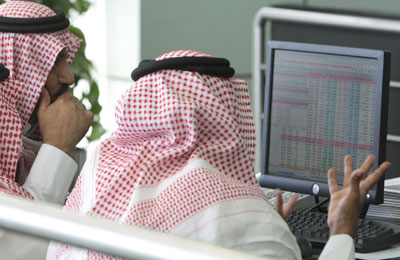
Q1 earnings likely to propel Saudi stocks
Riyadh, April 5, 2013
By Nadia Saleem
Saudi Arabia's bourse has underperformed most of its Gulf peers so far this year but the release of first-quarter corporate earnings, expected in the next few weeks, may give the market a leg up.
The kingdom's heavyweight stocks - petrochemical producers and banks - have struggled to advance because earnings in the last quarter of 2012 were unimpressive. This has held back the market's main index.
Depressed net interest margins have weighed on banks, but investors remain hopeful that bottom lines will improve this year.
"The outlook for banks' earnings year-on-year is still positive - we have demand for mortgages and personal loans as well as commercial banking products," said Hesham Tuffaha, a Riyadh-based fund manager.
In late February, Saudi Arabia issued final regulations for real estate financing, leasing and supervision of financial companies under its planned mortgage law, which the government hopes will help to rectify a housing shortage.
To develop the mortgage sector, the central bank announced plans to launch a real estate refinancing company with 5 billion riyals ($1.3 billion) of capital.
Banks with strong retail and consumer lending businesses may benefit most from the mortgage law in the next few years. These include Bank Albilad and Saudi British Bank.
"Banks still have a question mark, but you might see a trigger for the Saudi market - from a macroeconomic perspective, everything is in place. There isn't a reason to be bearish," said Ali Adou, portfolio manager at The National Investor in the United Arab Emirates.
RETAIL
The strongest first-quarter growth may come from the retail sector, which is enjoying robust consumption in the Arab world's largest economy; gross domestic product is forecast to expand 4.0 percent in 2013, according to a Reuters poll of analysts in January.
"Investors will keep their focus on consumer-related stocks since that side of the story is intact, driven by implacable demand for healthcare, food, electronics and clothing, and growing spending ability," said Sleiman Aboulhosn, investment analyst at ING Investments.
"Overall, I think Q1 can set a positive tone for the year in terms of earnings."
Prices of retail stocks as a group climbed 11 percent in the first quarter, and analysts think their first-quarter earnings growth may have hit double digits.
The government's drive to bring down unemployment among Saudi citizens, through a quota system and financial incentives, is a concern for retail companies and the stock market in general. It is making the hiring of cheaper foreign workers more difficult and more expensive for some firms.
It is also increasing the spending power of local citizens, however, and for now at least the stock market is focusing on this factor.
"I see potential in the retail sector - the stocks are standing on solid fundamentals that are driven by local consumption, which keeps growing," said Tuffaha.
Food and fashion retailer Fawaz Abdulaziz Alhokair and bookstore chain Al Jarir are each projected to post 10 percent growth in first-quarter profit from a year earlier, according to NCB Capital.
PETROCHEMICALS
In the petrochemical sector, the picture is much more ambivalent. Saudi Basic Industries Corp (Sabic), the world's largest chemical producer, is expected to post a year-on-year decline in first-quarter profit of nearly 15 percent, according to NCB Capital and Riyad Capital.
"Most of the petrochemical stocks are trading at fair value and earnings are expected to be mixed," said Muhammad Faisal Potrik, research analyst at Riyad Capital.
Even so, many analysts have kept overweight recommendations for SABIC, which may have upside in earnings for the later part of this year.
"For the full year it will experience growth and valuations are attractive - SABIC has lagged other petrochemical stocks," Potrik said. In particular, SABIC could benefit from a larger profit contribution from subsidiary Saudi Kayan Petrochemical .
The kingdom's main stock index is up 5.5 percent year-to-date, underperforming Dubai and Abu Dhabi , which have risen more than 10 percent. Kuwait's index is up about 13 percent.
The Saudi index, which closed at 7,178 points on Wednesday, has in the past two weeks tested but failed to break major technical resistance around 7,200 points, which has capped the market repeatedly since the third quarter of last year.
Tuffaha predicted, however, that the index would break above 7,200 after first-quarter earnings, possibly targeting the 7,500-point level. - Reuters







